Book1Unit4 Usinglanguage 语言点
【教案】人教版选择性必修一Unit 4 Using language 教学设计
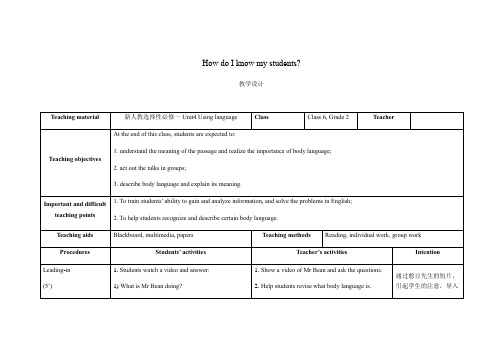
1.Show a video of Mr Bean and ask the questions.
2.Help students revise what body language is.
通过憨豆先生的短片,引起学生的注意,导入话题:body language。
Important and difficult teaching points
1. To train students’ ability to gain and analyze information, and solve the problems in English;
2. To help students recognize and describe certain body language.
12.Discuss with partners to describe body language in the pictures and explain its meanings.
9.Show pictures of different situations and ask students to describe them.
Leading-in
(5’)
1.Students watch a video and answer:
1)What is Mr Bean doing?
2)Does he know the answers to the questions in the paper?
3)How do you know that?
Reading for the main idea
(5’)
新外研版高中英语必修第一册Unit 4教学设计
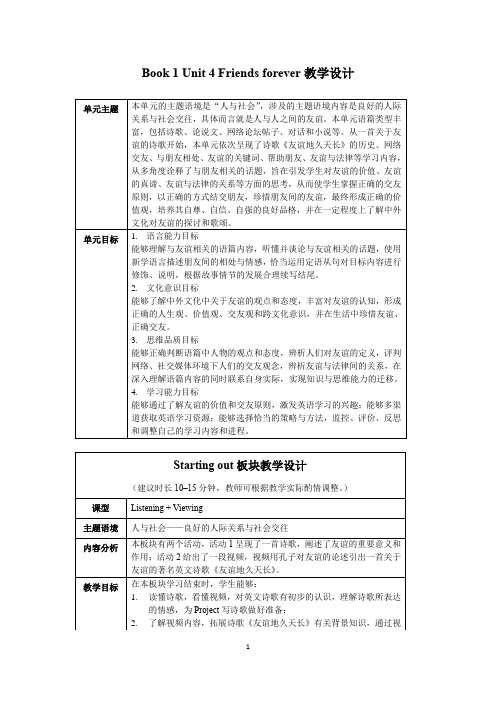
1.Students listen to the poemcarefully.
2.Students read the poem.
3.Studentsdiscuss the main idea of the poem and answerthetwoquestions.
3.Students check the answers with the teacher.
4.Students read the passage againto furtherunderstand the structure of the passage.
5.Some students retell the passage.
2.Some studentssharetheiranswerswith the class.
To figure out theauthor’spurpose in writing the passage.
Activity 4
1.Teacher asks students to read the passage carefully and figure out thestructureof the passage.
3.思维品质目标
能够正确判断语篇中人物的观点和态度,辨析人们对友谊的定义,评判网络、社交媒体环境下人们的交友观念,辨析友谊与法律间的关系,在深入理解语篇内容的同时联系自身实际,实现知识与思维能力的迁移。
4.学习能力目标
能够通过了解友谊的价值和交友原则,激发英语学习的兴趣;能够多渠道获取英语学习资源;能够选择恰当的策略与方法,监控、评价、反思和调整自己的学习内容和进程。
外研版选择性必修四 Unit 4 Using+language语法课件- 英语课件

关系代词和关系副词除起连接作用外,还在定语从句中充当一定的 成分。
一、关系代词的用法
所作成分 作主语 作宾语 作定语
人
who/that whom/
that/who
whose
指代对象
事物
人+事物
which/that that
which/that that
whose
是否可省略
否 是
否
The prize will go to the writer whose story shows the most imagination. Anyone who intends to get a driver’s license must get an eye test. My sister wants to work in the power plant which/that is still being built.
(2)当先行词被only、very、just、last、all、no、little、few、any等 词修饰时。 This is the very film that I want to see.
(3)当先行词是序数词或被序数词修饰时。 The first thing that you should do is to listen carefully.
The movement has proven popular among young people who want to help producers get the payment they deserve.
However, some people who are less optimistic argue that it discriminates against producers who are not part of the Good Deal movement.
高二英语人教版第一册教案:Unit 4 Section C Using Language
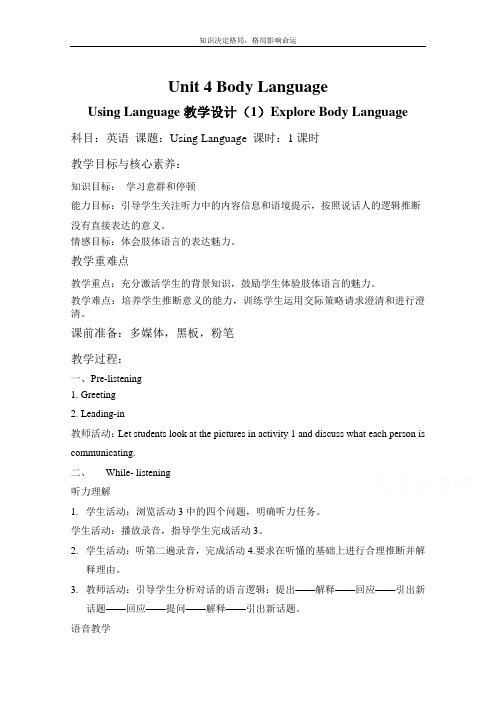
Unit 4 Body LanguageUsing Language教学设计(1)Explore Body Language科目:英语课题:Using Language 课时:1课时教学目标与核心素养:知识目标:学习意群和停顿能力目标:引导学生关注听力中的内容信息和语境提示,按照说话人的逻辑推断没有直接表达的意义。
情感目标:体会肢体语言的表达魅力。
教学重难点教学重点:充分激活学生的背景知识,鼓励学生体验肢体语言的魅力。
教学难点:培养学生推断意义的能力,训练学生运用交际策略请求澄清和进行澄清。
课前准备:多媒体,黑板,粉笔教学过程:一、Pre-listening1. Greeting2. Leading-in教师活动:Let students look at the pictures in activity 1 and discuss what each person iscommunicating.二、While- listening听力理解1.学生活动:浏览活动3中的四个问题,明确听力任务。
学生活动:播放录音,指导学生完成活动3。
2.学生活动:听第二遍录音,完成活动4.要求在听懂的基础上进行合理推断并解释理由。
3.教师活动:引导学生分析对话的语言逻辑:提出——解释——回应——引出新话题——回应——提问——解释——引出新话题。
语音教学(1)教师播放活动1的录音,让学生边听边关注每个句子中意群的划分和停顿。
(2)教师用幻灯片呈现没有划分意群的活动1中的长句,组织学生两人一组开展活动:小组中一人自己朗读没有划分意群的长句,另一个人认真记录同伴的停顿;然后两人交换角色。
接着,教师播放录音,全班跟读。
最后,以小组为单位讨论自己读的和录音的区别,并说一说划分意群的作用和规则。
(3)教师引导学生模仿活动1对活动2的文本划分意群。
教师解释划分意群的基本规则:A sentence can be divided into several sense groups according to the meaning, grammatical structures, and punctuation。
book4 unit1 using language

True or False.
1 Lin Qiaozhi traveled abroad just to study medicine. 2 The reason why she got into the medical school is her cleverness. F 3 The writer thought it was too late to improve his studies, so at last he didn’t chose the medical college. F 4 In her life, she didn’t get married.
3.What made Lin Qiaozhi succeed? It was her kindness and the consideration she showed to all her patients that made her succeed.
4. What did the writer decide to study at university? And why? She chose to study at medical college. Because she
generation
kindness
considerate adj. 考虑周到的; consideration n. 考虑;体谅 deliver vt. 递送;(生)小孩; 接生;发表(演说等) modest
adj. 谦虚的;谦让的; 适度的
作研究 引起某人的注意 为…准备,预订 和 ,也 ,又 接生 找出 献出某人的一生 进行…,继续进行…
Unit 1 Using language: Why not carry on her good work
Unit 4 Using language(Grammar)课件-高一英语上学期外研版必修第一册

主语
宾语
人或物,作主语或者宾语
指________________________,作宾语时可以省略
China is a country which has a long history..This is the book which you like.
2.关系代词which引导
物,作主语或者宾语
c We can... stay in touch with people. We want to remain friends with them.d The digital age also enables us to find people. These people share our interests…
Lucy is my friend who / that has a hearing problem.So I learnt a new language which / that allows me to “speak” with my hands.3 Lucy is a smart girl whose ideas are always inspiring.4 I sometimes have problems (that / which) I can’t solve.5 Lucy is a good listener (whom / who / that) I enjoy sharing moments of my life with.
关系代词填空
7. Could you please find a room __________ is big enough for all of us to live in?8. This is the second house__________we bought in France.9. He answered few questions__________the teacher asked.10. Can you give me anything__________can keep me warm?11. The first thing ___________should be done is to get some food.12. I think Guilin is the most beautiful city__________I have ever visited.13. Who is the man _________ you spoke to just now?
book1 unit4重点

Unit4 EarthquakesRight away/ right now/ at once/ immediately 立刻,马上have time to do 有时间做某事happen to do 碰巧做某事shake hands with sb 握手burst into tears/ laughterburst out crying/laughing突然哭/笑起来in ruins 成为废墟cut across 穿过、横穿cut down削减,砍倒cut off 切断blow away 吹走、刮走fall down 倒塌be shocked by/atrescue workers 救援人员rescue … from…把…从…救出来be pleased to do 乐意做某事make/ give a speech 发表演说judging from/ by 根据……来判断feel honored to do sth 做某事很荣幸It’s one’s honor to do sth 做某事是某人的荣幸find it an honor to do sth觉得做某事很荣幸in honor of 纪念…express one’s thanks to sb for sth 为某事向某人表达感谢be grateful to sb for sth 因某事对某人心存感激disaster-hit area 灾区collect/ raise money 集资,筹款collect stamps 集邮tens of thousands of 成千上万dig out 挖掘be buried in/ bury oneself in 专心于congratulations to sb on sthcongratulate sb on stha great/ large number of =a great many 大量的be trapped in/ under 陷入……/ 陷在……下面the high school speaking competition 高中演讲比赛have sb do sth= make sb do sth= let sb do sth 让某人做某事be at an end 结束了come to an end (vi) = put/ bring sth to an end = put/ bring an end to sth 结束某事make ends meet收支相抵be proud of / take pride in 以……而自豪invite sb to do sth 邀请某人做某事invite sb for/ to sththink little of 对……评价低think highly of 对……评价高one-third 1/3 two-thirds 2/3seventy-five percent 75%agree with sb agree to sth agree to do sth agree on sth 达成一致意见give out 发出(气味等);分发;耗尽give off 发出(气味等)give in 投降,上交give back 归还as you know 正如你所知道的 as is known to all 众所周知 as could be expected 正如可以预料到的be known as 作为……而知名be known for 因……而出名it is useless doing sth 干某事是无用的happen= take place= come about= break out发生;事件,战争等爆发injure/ hurt/ wounddamage/ destroy/ ruin3. Mice ran out of the fields looking for places to hide. 现在分词表伴随4. It seemed as if the world was at an end.5. Water, food and electricity were hard to get.句型:主语+ be + adj + to do 其中to do 用主动形式表示被动含义6. All hope was not lost. all 与not 连用表示部分否定7. It’s never too late to learn.活到老,学到老。
Unit4Usinglanguage学案- 高中英语外研版(2019)必修第三册
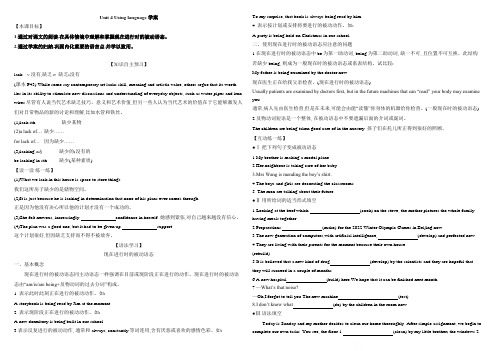
Unit 4 Using language 学案【本课目标】1.通过对课文的阅读,在具体情境中理解和掌握现在进行时的被动语态。
2.通过学案的归纳,巩固内化重要的语言点,并学以致用。
【知识自主预习】lack v.没有,缺乏n. 缺乏;没有(课本P43) While some say contemporary art lacks skill, meaning and artistic value, others argue that its worth lies in its ability to stimulate new discussions and understanding of everyday objects, such as water pipes and iron wires.尽管有人说当代艺术缺乏技巧、意义和艺术价值,但另一些人认为当代艺术的价值在于它能够激发人们对日常物品的新的讨论和理解,比如水管和铁丝。
(1)lack sth 缺少某物(2)a lack of… 缺少……for lack of… 因为缺少……(3)lacking adj. 缺少的;没有的be lacking in sth 缺少(某种素质)【读一读练一练】(1)What we lack in this house is space to store things.我们这所房子缺少的是储物空间。
(2)It is just because he is lacking in determination that none of his plans ever comes through.正是因为他没有决心所以他的计划才没有一个成功的。
(3)She felt nervous, increasingly confidence in herself. 她感到紧张,对自己越来越没有信心。
(4)The plan was a good one, but it had to be given up support.这个计划很好,但因缺乏支持而不得不被放弃。
Unit+4+Using+Language高中英语人教版(2019)选择性必修第一册
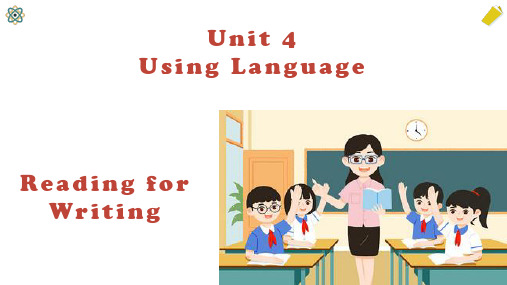
Please scan for the structure of the text, and draw a mind map of the passage.
Para.3: Recognize when students are interested or bored
Para.4: Recognize when students are distracted
Meaning
① struggling with what the teacher says.
② wear a serious expression
② daydreaming
③ make eye contact ④ raise his hand and smile
⑤ an absence of eye contact ⑥ have his head lowered
Unit 4 Using Language
Reading for Writing
Prediction
From the photo:
It may be about stories between the teacher and the students in a classroom.
From the title:
it is easy to perceive .... 很容易察觉到... it is sometimes much harder to distinguish ...有时很难区分... be troubled 有烦恼;陷入烦恼 experience anxiety 经历焦虑 have one's arms crossed 手臂交叉 have one's legs closed or crossed 双腿合拢或交叉 guarding their bodies 保护他们自己的身体 wear a frown 皱眉
新课标人教版必修一Book1 unit4 language points

as if/though 似乎,仿佛 5) 她坐在那儿,一副若无其事的样子。
She is sitting there as if nothing had happened.
6)他们看着我,就像我来自别的星球似的。
They look at me as if I were from another planet.
injured 6. Two-thirds of them died or were ________ during the earthquake. ⑴分子用基数(one, two…),分母用序数词(first, second…..),当分子超过1时,分母的词尾加s 1/6 one-sixth 1/3 one-third 2/3 two-thirds e.g. Two-thirds of the money was spent on food. 三分之二的钱花在了食物上。 Seventy percent of the workers in this factory are ______young.
Unit 4 Language points
Ⅰ.词汇与派生 1. burst 2. ruin 产 3. suffering [′sʌfərIŋ] n.苦难,痛苦 4. injure [′Indʒə] vt.损害,伤害→ injury n.受伤→ injured adj.受伤的 5. destroy [dI′strɔI] vt.毁坏,破坏;消灭→destruction n.破坏,毁坏 [bɜːst] vi.& n.爆裂,破裂 [′ruːIn] n.& vt.废墟;毁灭;使毁灭;使破
6.他正埋头看报纸。(bury)
He is buring himself in the newpapaer.
新视野大学英语第二版第一册Unit1单词语言点详解
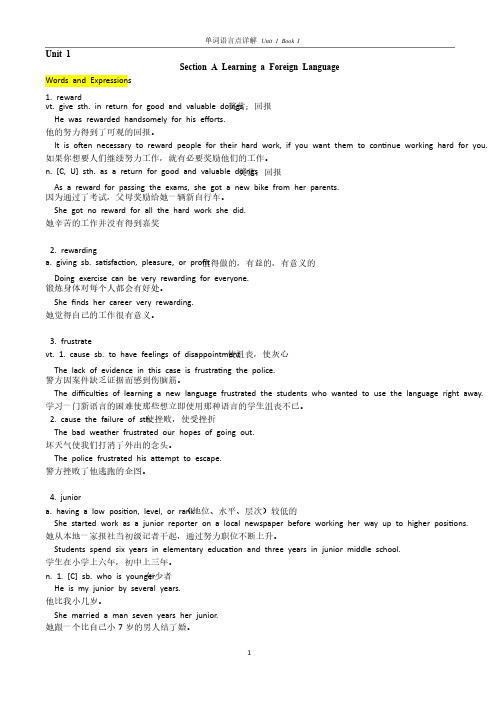
11. online a. connected to other computers through the Intern联et线 的;联网的;在线的
He took an online course to improve his English. 他选了网上课程以提高英语水平。
Between small changes and big changes, the former is more likely. 在小变化和大变化两者之中,前者的可能性更大。
2
单词语言点详解 Unit 1 Book I
Given the choice between a whipeople would choose the former because green is not popular. 如果让大家选择是要白 T 恤还是绿 T 恤,大多数会选择前者,因为绿色不流行。
9. in midate vt. create a feeling of fea恐r 吓,威胁
They in midated him into doing what they wanted. 他们胁迫他干他们要干的事。
John in midated his brother into not telling their parents the truth. 约翰威胁他弟弟,不准他把真相告诉父母。
Mobile phone is an important means of communica on. 手机是重要的通讯工具。
Genera on gap arises from a lack of communica on between the young and the old. 代沟的产生是由于青老年间缺乏交流。
book1_unit4_Using_Language

B.It’s about the changes of weather in the Tibetan mountains.
C.It’s about their meeting with their cousins. D.It’s about their journey in the Tibetan mountains.
_
view n.风景;视野;观点;见解 vt.观看;注视;考虑 写出下列句中view的含义 ①His view of life has changed a lot ever since the experience he had in Africa three years ago. 观点;见解 ②He climbed up to the top of the church tower to get a better view of the entire city. 景色;风景 ③When the old man opened the window, a stranger with a
We put up our tents and then we eat. Put up your hands if you have any questions. They put up many tall buildings last year. She put up the exam results. They have put the price up. I’m afraid I can’t put you up; you’ll have to go to a hotel. Put up: 搭起,盖起,张贴, 增加,举起,为提供膳宿
外研必修第一册Unit4_Using_language_名师课件
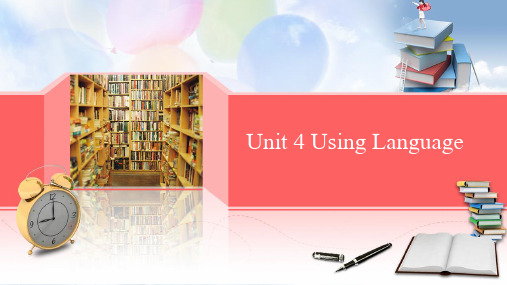
Presentation c We can... stay in touch with people. We want to remain friends with them. d The digital age also enables us to find people. These people share our interests…
Presentation
1. Now look for more sentences with these structures in the reading passage. Click for a friend P38-39 2. Sum up the words used in attributive 3. Complete the table
2. 介词常受先行词的制约(即介词和先行词的搭 配),例如:He built a telescope through which he could study the skies. (through which 即 through the telescope)
Co-construction
words
that which who whom whnt
other examples
Co-construction Grammar focus:Attributive clauses
一、定义:在复合句中,用来修饰名词或代词的从 句就叫做定语从句。这个从句在主句中充当定语成 分。被修饰的词叫先行词。引导定语从句的词叫引 导词,有关系代词和关系副词两类。 定语从句不同于单词作定语的情况,它通常只能放 在被修饰的词(即先行词)之后。
Unit 4 Using Language
课时目标:
高中英语book1unit4重点单词

高中英语book1unit4重点单词1. afraid (adj.): feeling fear or apprehensionExample sentence: I'm afraid of snakes; they terrify me.2. angry (adj.): feeling strong displeasure or rageExample sentence: She was angry at her brother for breaking her favorite toy.3. anxious (adj.): feeling worried or nervous about somethingExample sentence: He felt anxious about the upcoming exam.4. ashamed (adj.): feeling embarrassed or guiltyExample sentence: The boy was ashamed of cheating on the test.5. delighted (adj.): feeling great pleasure or happinessExample sentence: We were delighted to receive the invitation to the party.6. depressed (adj.): feeling sad and hopelessExample sentence: After losing her job, she became depressed.7. excited (adj.): feeling enthusiastic or thrilledExample sentence: The children were excited about going to the amusement park.8. glad (adj.): feeling pleased or happy about somethingExample sentence: I'm glad that you enjoyed the movie.9. lonely (adj.): feeling isolated or without companionshipExample sentence: She felt lonely after moving to a new city where she didn't know anyone.10. proud (adj.): feeling a sense of satisfaction or accomplishmentExample sentence: He was proud of his daughter for winning the award.11. surprised (adj.): feeling amazed or taken aback by something unexpectedExample sentence: I was pleasantly surprised when my friends threw me a surprise birthday party.12. upset (adj.): feeling distressed or disturbedExample sentence: The girl was upset by the news of her grandmother's illness.13. appreciate (v.): to value or recognize the worth of something or someoneExample sentence: I appreciate your help in completing this project.14. argue (v.): to engage in a verbal fight or disagreementExample sentence: The siblings often argue about who gets to use the computer first.15. care (v.): to have concern or interest in someone or somethingExample sentence: She cares deeply about animal welfare.16. comfort (v.): to provide solace or support to someoneExample sentence: The mother comforted her child after he fell down and hurt himself.17. forgive (v.): to pardon or let go of resentment towards someoneExample sentence: It took her a long time to forgive her friend for betraying her trust.18. trust (v.): to have faith or confidence in someone or somethingExample sentence: You need to trust yourself and believe in your abilities.19. argue (n.): a verbal fight or disagreementExample sentence: Their argument escalated into a heated debate.20. care (n.): concern or interest in someone or somethingExample sentence: She showed great care for the welfare of the homeless.21. comfort (n.): a state of solace or consolationExample sentence: The warm blanket provided her with comfort on the cold night.22. forgiveness (n.): the act of pardoning or letting go of resentment towards someoneExample sentence: His forgiveness was unexpected but greatly appreciated.23. trust (n.): faith or confidence in someone or somethingExample sentence: Building trust in a relationship takes time and effort.24. apologize (v.): to express regret or say sorry for one's actionsExample sentence: He apologized for being late to the meeting.25. forgive (v.): to pardon or let go of resentment towards someoneExample sentence: It is important to forgive others in order to move on and find peace.26. greet (v.): to welcome or acknowledge someone's presence with words or gesturesExample sentence: They greeted each other with a warm hug.27. insult (v.): to offend or hurt someone's feelings intentionallyExample sentence: He insulted her by making cruel jokes about her appearance.28. encourage (v.): to give support, motivation, or praise to someoneExample sentence: The coach encouraged the team to give their best effort in the game.29. comfort (v.): to provide solace or relief to someoneExample sentence: She comforted her friend by listening to her problems and offering advice.30. trust (v.): to have faith or confidence in someone or somethingExample sentence: Trusting your gut instincts can often lead you in the right direction.31. apologize (v.): to express regret or say sorry for one's actionsExample sentence: He apologized for being late to the meeting.32. forgive (v.): to pardon or let go of resentment towards someoneExample sentence: It is important to forgive others in order to move on and find peace.33. greet (v.): to welcome or acknowledge someone's presence with words or gesturesExample sentence: They greeted each other with a warm hug.34. insult (v.): to offend or hurt someone's feelings intentionallyExample sentence: He insulted her by making cruel jokes about her appearance.35. encourage (v.): to give support, motivation, or praise to someoneExample sentence: The coach encouraged the team to give their best effort in the game.36. comfort (v.): to provide solace or relief to someoneExample sentence: She comforted her friend by listening to her problems and offering advice.37. trust (v.): to have faith or confidence in someone or somethingExample sentence: Trusting your gut instincts can often lead you in the right direction.38. argue (n.): a verbal fight or disagreementExample sentence: Their argument escalated into a heated debate.39. care (n.): concern or interest in someone or somethingExample sentence: She showed great care for the welfare of the homeless.40. comfort (n.): a state of solace or consolationExample sentence: The warm blanket provided her with comfort on the cold night.41. forgiveness (n.): the act of pardoning or letting go of resentment towards someoneExample sentence: His forgiveness was unexpected but greatly appreciated.42. trust (n.): faith or confidence in someone or somethingExample sentence: Building trust in a relationship takes time and effort.43. apologize (v.): to express regret or say sorry for one's actionsExample sentence: He apologized for being late to the meeting.44. forgive (v.): to pardon or let go of resentment towards someoneExample sentence: It is important to forgive others in order to move on and find peace.45. greet (v.): to welcome or acknowledge someone's presence with words or gesturesExample sentence: They greeted each other with a warm hug.46. insult (v.): to offend or hurt someone's feelings intentionallyExample sentence: He insulted her by making cruel jokes about her appearance.47. encourage (v.): to give support, motivation, or praise to someoneExample sentence: The coach encouraged the team to give their best effort in the game.48. comfort (v.): to provide solace or relief to someoneExample sentence: She comforted her friend by listening to her problems and offering advice.49. trust (v.): to have faith or confidence in someone or somethingExample sentence: Trusting your gut instincts can often lead you in the right direction.50. argue (n.): a verbal fight or disagreementExample sentence: Their argument escalated into a heated debate.51. care (n.): concern or interest in someone or somethingExample sentence: She showed great care for the welfare of the homeless.52. comfort (n.): a state of solace or consolationExample sentence: The warm blanket provided her with comfort on the cold night.53. forgiveness (n.): the act of pardoning or letting go of resentment towards someoneExample sentence: His forgiveness was unexpected but greatly appreciated.54. trust (n.): faith or confidence in someone or somethingExample sentence: Building trust in a relationship takes time and effort.55. appreciate (v.): to value or recognize the worth of something or someoneExample sentence: I appreciate your help in completing this project.56. argue (v.): to engage in a verbal fight or disagreementExample sentence: The siblings often argue about who gets to use the computer first.57. care (v.): to have concern or interest in someone or somethingExample sentence: She cares deeply about animal welfare.58. comfort (v.): to provide solace or support to someoneExample sentence: The mother comforted her child after he fell down and hurt himself.59. forgive (v.): to pardon or let go of resentment towards someoneExample sentence: It took her a long time to forgive her friend for betraying her trust.60. trust (v.): to have faith or confidence in someone or somethingExample sentence: You need to trust yourself and believe in your abilities.。
Unit 4 Period 4 Using Language (II) 课件

3 The boy is telling a joke to the girl in secret, and she is hiding her face because she is laughin3 Exchange your draft with a partner. 1 Use the checklist to help you review your partner's draft. √ Is the person properly identified? √ Is the description clear? √ Does the writer give his/her impressions of the feelings and
学习总结
1. Can you tell a story about how your teacher read what you are thinking by reading your body language?
2. Find more pictures and explain what you get from the body language.
A very interested B bored C interested D sad or worried E distracted F writing notes G serious problems H like they are asleep I daydreaming J angry, afraid, or experiencing
高中英语《Unit1 Using language---language points》 必修4

Unit 1 Using language---languagepoints教材分析(analysis of teaching material)In this part, students will learn the language points about the passage. There are many language points and many new words. It is difficult for students to remember them and use them well. By leaning them, students can use them towrite some sentences to describe a person or a thing. More important, students should able to use them in their composition.学情分析(analysis of the students)Our students are not good at language points. With the help of exercise book, students can learn some first by themselves. Teacher should encourage students to do it firstly, and then point out the mistakes and help them grasp the importance.教学目标(Teaching aims)知识目标(Knowledge aims)1.Words and expressions: look down upon/on; refer to; reference; carry on;come across; as well as; intend; deliver…2. Sentences: Suddenly it hit me how difficult it was for a woman to getmedical training at that time.it 做形式主语,真正的主语是后面的主语从句It hit(s) sb. that….某人突然想起能力目标(Ability aims):students can use the language points and can do the exercise by themselves correctly. Can use those sentences and words to describe a thing or a person; can use those structures in their composition.情感目标(Emotional aims):raise students interest in English; can use new words and expression fluently; can say something with those sentences; can talk with others easily.教学重点和难点(teaching important points and difficult points)#Teaching important points: all language points about these passage; finish all exercise in the book.#Teaching difficult points: Suddenly it hit me how difficult it was for a woman to get medical training at that time.it 做形式主语,真正的主语是后面的主语从句It hit(s) sb. that….某人突然想起教学过程(Teaching procedures)Step 1: review the passage and recite the new words and expressions.Step 2: language points1.Many people look down upon poor people.look down upon/ on 蔑视,看不起The black were looked down upon in the United States before the Civil War.拓展:look up to 尊敬look into 调查,了解look around/round 环顾look through 浏览,仔细查看look out (for) 注意,消息look forward to 期盼,盼望look back 记起,回想look after 照顾look on sb. as 把某人看做2.If the word group refers to different members, use a plural verb.group在这指不同成员,(谓语)用复数形式refer to 查阅,参考,谈到,提及,涉及If you don’t know what the word means, refer to the dictionary.拓展:reference n. a reference book 一本参考书3.Why not carry on her good work?carry on 继续,坚持,进行Though it rained hard, they carried on working in the fields.拓展: carry away 运走,使失去自制力carry of 赢得,夺走carry out 实行,执行carry over 保持,持续carry through 渡过难关,成功完成4.By chance I came across an article about a doctor called Lin Qiaozhi, aspecialist in women’s diseases.come across (偶然)遇见,碰见,发现I came across his name on the list.拓展: come about 发生,造成come around/ round 看(看望或找到某人)come by 得到come down 下降,跌价come out 出版,开花come over 从远处来到come up 走进,被提出5.It seemed that she had been very busy in her chosen career, travellingabroad to study as well as writing books and articles.as well as除……之外(也),既……又……接两个同类项时,强调as well as 前面的人或事情He came as well as his brother.6.One of them caught my eye.catch sb.’s eye 引起(某人)注意,被某人看到She brought a new dress that had caught her eye in the shop.7.I looked carefully at the text and realized that it was intended for womenin the countryside.intend v 打算,计划His mother intends him to become an engineer.拓展: be intended for …为……而准备be intended to …打算做……be intended as …目的是作为……8.Suddenly it hit me how difficult it was for a woman to get married trainingat that time.It在这是形式主语,真正的主语是how difficult引导的主语从句It hit(s) sb. that…某人突然想起……It hit me that the lights in the classroom hadn’t been turned off.拓展: strike/ occur to sb. 某人突然想起9.There was story after story of how Lin Qiaozhi, tired after a day’s work,went late at night to deliver a baby for a poor family who could not pay her.deliver v 给……接生;分娩;投递;传送;运送;讲;宣布Which doctor delivered the baby?10.She is kind and considerate to…considerate adj. 体贴的,体谅的,考虑周到的,替人着想的be considerate of others 能体谅别人的He was considerate of everyone.拓展:consideration n. 考虑consider v 考虑,细想,认为,把……看做,考虑到take sth. into consideration 考虑到John never showed any/ had no consideration for anyone else. 板书设计课堂提问:1.Please write down some words to describe the great person and hand in.2.Please retell the story and read it to your classmates.练习:用look的相关短语填空1.The police have _______ the cause of the accident, but the reasons arestill not known to us.2.I’m ________ receiving your letter earlier.3.He _____ the book and decided that he wouldn't like it.4.To _____ others is a virtue at any time.Keys: 1 looked into 2 looking forward to 3 looked through 4 look up to汉译英1.我突然明白我们如何能改善局面了。
- 1、下载文档前请自行甄别文档内容的完整性,平台不提供额外的编辑、内容补充、找答案等附加服务。
- 2、"仅部分预览"的文档,不可在线预览部分如存在完整性等问题,可反馈申请退款(可完整预览的文档不适用该条件!)。
- 3、如文档侵犯您的权益,请联系客服反馈,我们会尽快为您处理(人工客服工作时间:9:00-18:30)。
1. His classmates all ________________him on his success and the _________________made him excited.(congratulate)
2.他祝贺他赢得比赛。
He ____________him ________winning the game just now.
8.从他说的话来看,他很高兴被邀请。
__________ __________what he said, he _______ _________ _______be invited.
9.我们都为他的巨大变化感到骄傲。
We _______ _________ __________his great changes.
10. They are proud to belong to such a fine team.(翻译)
_____________________________________________________________
11. His uncle was _______ ________ _________(掌管)the big company.
14.The book was written____________________(为了纪念)those who died in the war.
15当老师进教室的时候,他正埋头学习。
16用frighten的正确形式填空
He was ____________ at the ___________news.
2.be proud to do____________________
3.be proud that_____________________
补充点3:
honor n.________________, honor v._____________________
1 in honor of_____________
The __________ story that the movie showed _____________him when he was alone at home.
学习活动四:知识构建
我的收获:
我的疑问:
3.我成功地通过了驾照考试。---------祝贺你。
I successfullypassed the driving license.-----------____________________
4.我们不能以貌取人。
_______________________________________________________________
7.my pleasure/with pleasure
①Thank you very much. ------ (It’s)___________________
②Could you please help me solve this problem?--------_________________________
12.________________(众所周知), the earth travels around the sun.
13.今天被邀请到这,深感荣幸。
It was a great _________to be invited here today.
I amto be invited here today.
Book 1 Unit4 Earthquakes
Period 4 Language points
一【学习目标】
1.掌握课文中重点词汇、短语的用法。
2.能在具体语境中正确使用所学知识点。
二【学习过程】
学习活动一:自主学习:
Reading
1完成《练习册》p84文本感知I .判断正误
2完成《练习册》p84文本感知II .语篇理解
学习活动二:课前自学探究《练习册》P84-86重点互动探讨
补充点1:
pleased adj.___________________, pleasure n._____________________
1. be plea___
2. be pleased with _______________________
2 in need of ____________
3 in praise of _______________
4 in charge of____________
5 in name of____________
补充点4:
1.frighten vt.
2.frightening adj.
3.frightened adj.
3. my pleasure _______________________
4. with pleasure ______________________
补充点2:
proud adj.___________________; pride n._______________________
1.be proud of = take pride in____________________________
5.我们很高兴参加了你的晚会。
We ________ __________ _________ take part in your party.
6.英语老师对我学习上的巨大进步感到很高兴。
____________________________________________________________________
